
Syrian refugees
(Turkey)
Period: 2021-present day
Area: Kilis province, Kahramanmaras province, Sanliurfa Province, Northwest Syria, SalqinCity
Human Resource Development Project for Syrian Refugees and Host Communities in Turkey
Support Activities in Brusa Province, Brusa
The goal of the program is to increase the employment opportunities of Syrian refugees and host communities in Bursa province by providing trainings of skills which are highly demanded in the market. Training and education in the necessary skills will improve their employability through the acquisition of government certified certificates and qualifications. The program also supports trainings of job-specific language and intermediary access to public services to make it easier for people from Syria to live and work in Turkish society. In addition, they will gain practical training on the skills they have learned at companies and organizations, which will improve their skills that meet the demands of the labor market in Bursa and enable them to choose a better working environment. Specifically, the program will (1) provide materials and equipment to training centers and (2) will provide a variety of employment support such as job training, career counseling, and language acquisition support specific to job-related terms at those facilities and companies, etc., grouping job seekers according to their needs, background, interests, skills, and circumstances, and training in various occupations and each Turkish language classes specific to the occupational category. By learning high-demand skills, acquiring job-specific Turkish terminology that is a barrier for Syrian refugees, and earning certificates (training certificates), JEN aims to support them find jobs that utilize their skills and stabilize the areas in which they live.
Specific assistance
1. Provision of materials and equipment to training centers
2. Vocational training at those facilities and companies
3. Career counseling
4. Language acquisition support specific to job-related terminology
Improvement made by support
It will improve access to materials and infrastructure necessary for capacity building of the Syrian refugees and of the host community in Turkey. It will also improve their skills that meets the demands of the labor market in Bursa, and allow them to choose a better working environment.
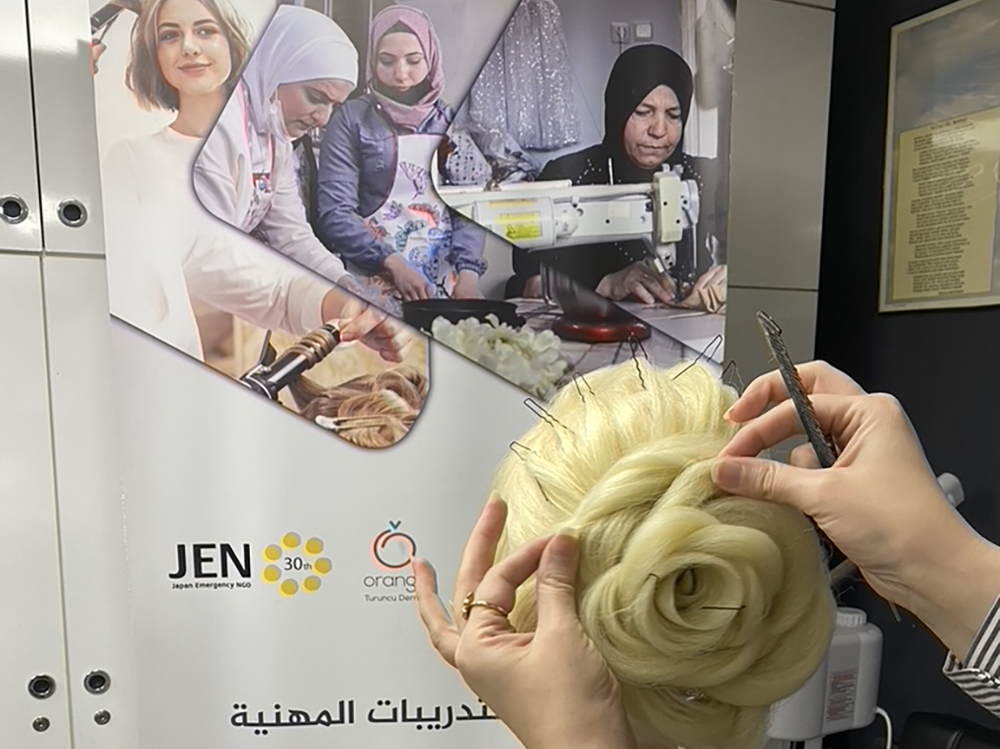
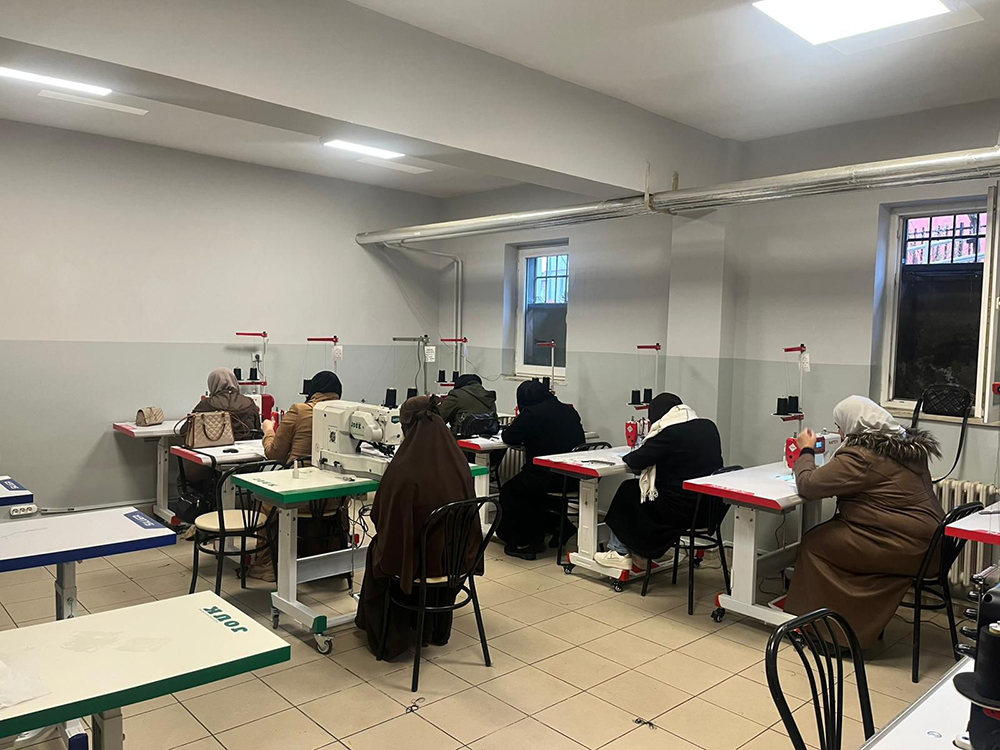
Supporting soup kitchens for earthquake survivors for sustainable recovery
Support Activities in Hatay province
Hatay Province was severely affected by the Turkey-Syria Earthquakes happened in February 2023. Eleven soup kitchens in the province are currently assisting vulnerable populations, but their operations are unstable as they rely on volunteers and donations.Many of the staff members are psychologically affected by the disaster, which might affect stable operation of soup kitchens. This project supported the operating costs (for foods, consumables, and personnel expenses,) of two soup kitchens to stabilize their operations during the project period. The project also provided psycho-social care to the staff of the facilities to relieve their anxiety. At the same time, we supported the development and implementation of a capacity-building plan for the soup kitchen and assisted its income generating plan to improve its sustainability.
Specific assistance
1. To support the operational costs of the soup kitchen
2. To provide psycho-social care for the staff of the soup kitchen.
3. To support planning and implementation of capacity building plan of soup kitchens.
Improvement made by support
The project will support stabilizing the operation of the soup kitchen, and, through the capacity-building plan, it will improve the sustainability of the soup kitchen.
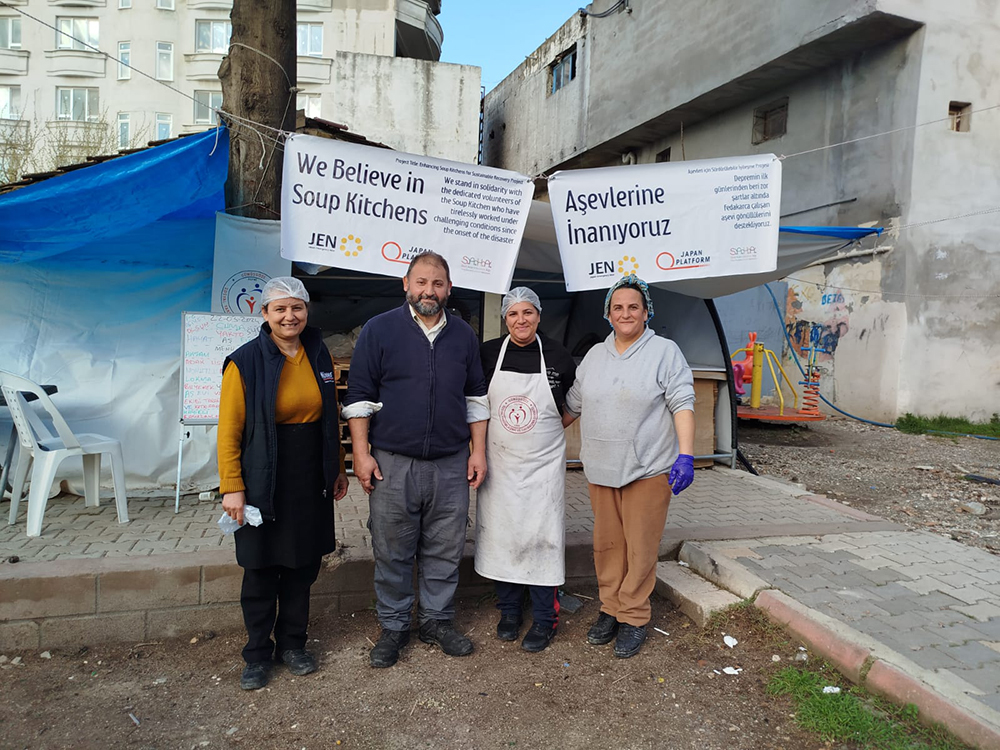
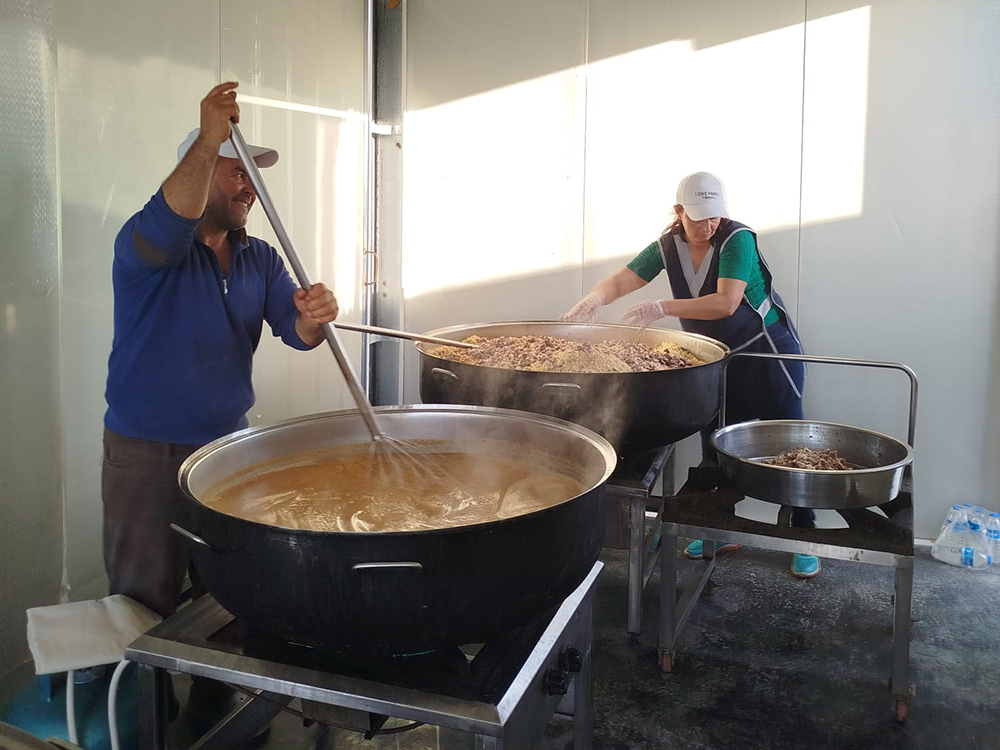
Emergency assistance for Turkish and Syrian earthquake victims
Relief Activities in Kahramanmaras and Sanliurfa Provinces, Turkey
JEN distributed food to 12,565 people, as well as bedding and hygiene items to 7,016 people (both cumulative). These people all reside in the Kahramanmaras and Sanliurfa Provinces, which were heavily impacted by the earthquake. As both provinces are relatively close to the Syrian border, and many Syrian refugees live in the area.
JEN provided food, blankets, mattresses, and other bedding to support evacuees living in cold weather with inadequate heating facilities. Hygiene kits were also distributed to provide emergency assistance for the vulnerability to diseases (which has become a growing concern during the evacuation).
JEN supported the displaced people to have some comfort to live and begin rebuilding their lives.
Improvement made by support
JEN distributed food and urgent supplies to people affected by the earthquake in southeastern Turkey. Specifically, JEN provided food to the cumulative of 12,565 people and bedding and hygiene items to 7,016 people. This improved the food crisis and sanitary conditions needed to survive the evacuation and winter season.
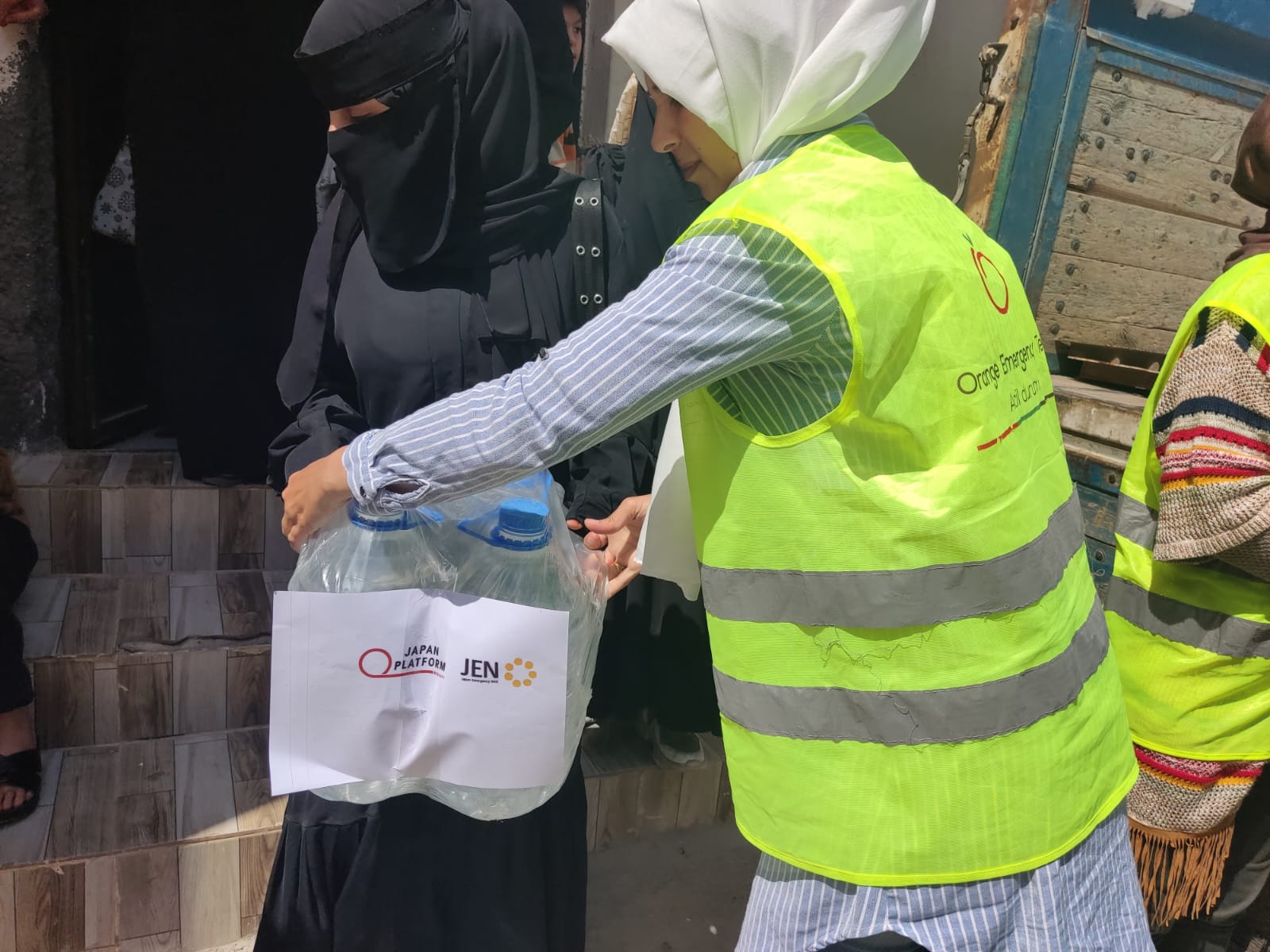
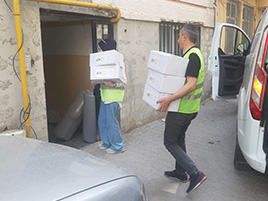
Support Activities in Salqin, Northwest Syria
The earthquake that struck northwest Syria caused extensive damage to infrastructure and water in the region. Families have been displaced and are currently residing in temporary camps. People do not have access to clean water or proper sanitation facilities. For example, the temporary camps have an estimated one toilet per 150 or more people. The population was labeled vulnerable prior to the earthquake, and now the natural disaster has exacerbated the situation. For this reason, JEN has provided water and sanitation assistance to a temporary camp in Syria. Ten sanitation facilities with toilets, shower rooms, and hand washing facilities were constructed in the Syrian temporary camps.
Improvement made by support
More than 1,800 people have benefited from these sanitation facilities.
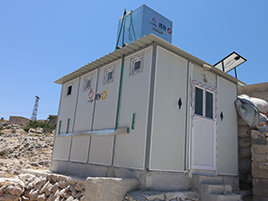
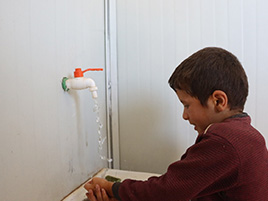
Food assistance project for Syrian refugees and host communities affected by COVID-19
In Turkey's Kilis Province, JEN has provided food aid to Syrian refugees and host communities suffering from unemployment and loss of income created by COVID-19. Specifically, JEN has distributed food vouchers for local contracted stores. The Kilis Province is located in southeastern Turkey and borders Syria. Therefore, many people who came to Kilis Province fleeing conflict from Syria are living as refugees. Refugees are forced to work for lower than the minimum wage. The lives of such vulnerable people have only worsened after COVID-19. For these reasons, JEN distributed food vouchers to help stabilize their livelihoods.

Emergency food assistance being provided in the province of Kilis
Distribution of food vouchers
Syrian refugees and vulnerable host community members in Kilis province require food assistance. This project distributes food vouchers to approximately 2,500 households, enabling each household to procure food items according to their preferences and needs. The food vouchers are given in the form of prepaid cards, which the amount is determined according to the number of people in the household. The voucher can be used as many times as needed within a specified period of time. Alcohol and cigarettes are not eligible for purchase.
Current situation of Syrian refugees and vulnerable host communities
Turkey has hosted more than 3.7 million Syrian refugees since the start of the Syrian crisis in 2011. With rapid population growth burdening the country, it is difficult for refugees to obtain work visas, resulting in most being denied the ability to work. Refugees without work visas generally work in the informal sector and are forced into situations where they earn less than minimum wage with the risk of losing their job at any time.
After the spread of COVID-19, refugees in the region and vulnerable members of the host community, burdened by the rapid influx of refugees, experienced another struggle. These people were met with job loss and reduced income, resulting in eating less to remove the expense of food (creating nutritional deficiencies). Furthermore, prices in Turkey have been rising sharply since 2021, exacerbating the situation.

Woman shopping at a contract distributor supermarket
To create a sustainable situation
JEN provides emergency assistance to people who are food insecure. We monitor the area to identify medium and long term needs within the community, focusing on improving livelihood, capacity building, and psychosocial support.
